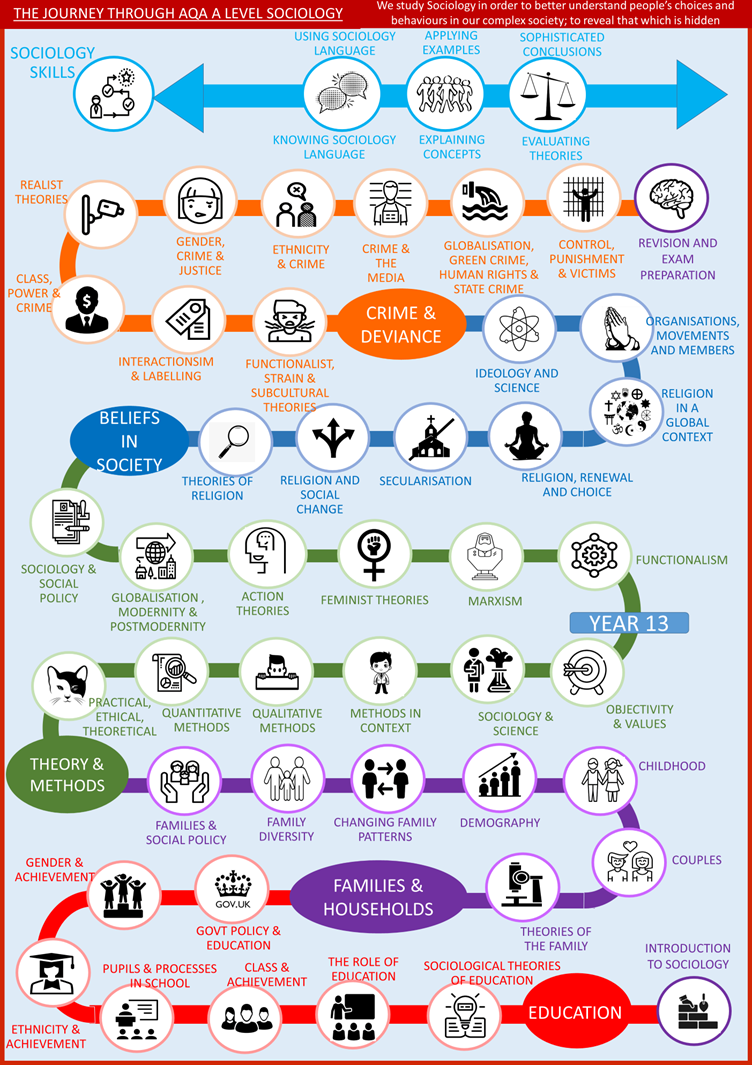A level Sociology Year 12 & 13
Specification
AQA 7061 - The specification and assessment structure can be found at the link: https://www.aqa.org.uk/subjects/sociology/a-level/sociology-7192/specification
Curriculum Intent
We study sociology to better understand people’s choices and behaviours in our complex society, to reveal what is hidden.
Students will learn the fundamentals of the subject and develop skills valued by higher education and employers, including critical analysis, independent thinking and research.
Key Features
Sociology is the study of the development, structure and functioning of human society, including the study of social problems. Sociology requires open minds and critical thinkers with a willingness to analyse up-to-date studies and current affairs, as well as reflecting on classic 19th-century theories.
Subject content
In their study of the topics listed below, students should examine topics in relation to the two core themes (socialisation, culture and identity; and social differentiation, power and stratification) and explore both the evidence of and the sociological explanations for the content listed in the topic areas.
What background do I need?
Most students joining this course will have no prior experience of the subject. The A level examinations require students to showcase knowledge and understanding through 20 and 30-mark essay questions, as well as some shorter questions from 4 to 10 marks. In this light, a strong grade in an essay-based GCSE subject, for example English, is important. Alongside this, students need to have a keen interest in the subject, including a desire to broaden your knowledge and understanding on society and human behaviours. Sociology requires open minds, critical thinkers, good organisational skills and independent learners. The subject is constantly updating and as well as looking at classic sociological theories it is desirable for students to remain up to date with current affairs relevant to our course.
Opportunities
The AQA A level Sociology is useful for a wide range of career pathways and higher education journeys. Sociology is particularly favourable for those who seek to work in fields related to research, public policy, social work and human services. Some of our career links include; journalist, welfare rights officer, family mediator, family support office, housing officer, human resources officer, aid worker, care worker, clinical psychologist, life coach, media researcher, police officer, teacher, barrister, lawyer.
A level Sociology may also support students in pursuing their education at university level, with particular links to those wishing to study Law, Criminology, Education Studies or Sociology itself.
How it's assessed
| Component 1:
Education with Theory and Methods |
Paper 2: Families and households, Beliefs in Society | Paper 3:
Crime and Deviance with Theory and Methods |
|
What is assessed? 80 Mark paper lasting 2 hours |
What is assessed? 80 Mark paper lasting 2 hours |
What is assessed? 80 Mark paper lasting 2 hours |
Year 12
|
|
Topic |
Further details about the topic |
|---|---|---|
|
Autumn Term |
||
|
1 |
Introduction and transition test Theories of education The role of education Class and achievement Pupils and processes in schools |
|
|
2 |
Ethnicity and achievement Gender and achievement Government policy and education |
|
|
Spring Term |
||
|
1 |
Exam skills and revision (mop up any missed/ overflow) Theories of the family Couples Childhood |
|
|
2 |
Demography Changing family patterns Family diversity Families and social policy |
|
|
Summer Term |
||
|
1 |
Practical, ethical, theoretical Quantitative methods Qualitative methods Methods in context Sociology and science Objectivity and values |
|
|
2 |
Functionalism, Marxism, Feminist theories Action theories Globalisation, modernity, postmodernity Sociology and social policy |
|
Year 13
|
|
Topic |
Further details about the topic |
|---|---|---|
|
Autumn Term |
||
|
1 |
Theories of religion Religion and social change Secularisation Religion, renewal and choice |
|
|
2 |
Religion in a global context Organisations, movements and members Ideology and science Exam skills and revision (mop up any missed/overflow) |
|
|
Spring Term |
||
|
1 |
Functionalism, strain and subcultural theories, Interactionism and labelling Class, power and crime Realist theories Gender, crime and justice |
|
|
2 |
Ethnicity and crime Crime and the media Globalisation, green crime, HR, state crime Control, punishment and victims |
|
|
Summer Term |
||
|
1 |
Exam skills and revision |
|
Assessments
| Resources | Topic | Type of assessment |
|---|---|---|
| CAT 1 |
Paper 1 Education topics 1-4 |
AQA past paper questions |
| CAT 2 |
Paper 2 Families and Households topics 1-4 |
AQA past paper questions |
| CAT 3 |
Paper 1 Education with Theory and Methods (full paper) |
Mock exam |
| CAT 4 |
Paper 2 Families and Households, Beliefs in Society (full paper) |
AQA past paper questions |
| CAT 5 |
Paper 3 Crime and Deviance with Theory and Methods (full paper) Paper 1 and 2 hybrid |
|
Main Resources
| Resource | Details |
|---|---|
| Text books |
AQA A Level Sociology Book One’, Napier Press (Webb, Westergaard, Trove and Townend) ‘Revise AQA A Level Sociology’, Pearson |
|
Recommended Reading |
‘The Sociology Book’ by Sarah Tomley Learn about how we organise our society in The Sociology Book. Part of the fascinating Big Ideas series, this book tackles tricky topics and themes in a simple and easy to follow format. Learn about Sociology in this overview guide to the subject, brilliant for beginners looking to learn and experts wishing to refresh their knowledge alike! The Sociology Book brings a fresh and vibrant take on the topic through eye-catching graphics and diagrams to immerse yourself in. According to Jones, the working class has become an object of fear and ridicule in Britain today. His book explores how the working class has gone from "salt of the earth" to "scum of the earth." The chav stereotype, he argues, is used by governments as a convenient fig leaf to avoid genuine engagement with social and economic problems and to justify widening inequality. A useful read to complement our Sociology topics on Marxism. ‘Gang Leader for a Day’ by Sudhir Venkatesh |
| Recommended websites |
A-Level Sociology: Revision Notes, Mind Maps and Exam Help # - ReviseSociology |
Enrichment opportunities
|
|
|---|
|
Each year the Department of Sociology at the University of Cambridge hosts a photography competition aimed at students in Years 10-13. The theme is refreshed annually and the deadline falls in May. The competition is meant as a documentary style of photography. For those who would like to see examples of previous winning entries, check out the main competition page here. |








